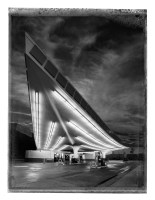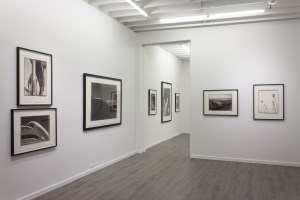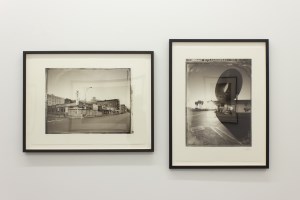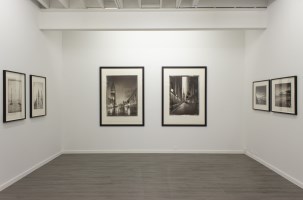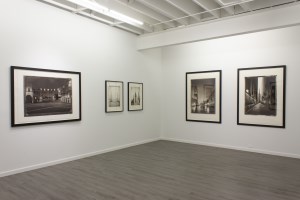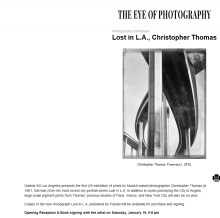Lost in L.A.
-
Exhibition
"Lost in L.A."
from Saturday, January 19, 2019 to Saturday, March 2, 2019
Galerie XII Los Angeles
Galerie XII Los Angeles is pleased to present the first US exhibition of prints from the series Lost in L.A. by Munich-based photographer Christopher Thomas. In addition to works portraying Los Angeles, pigment prints from Thomas’ previous studies of Paris, Venice, and New York are also included in the exhibition.
When Christopher Thomas set out to make a “city-portrait” of Los Angeles, the fifth metropolis to be the focus of his signature series over the past two decades, he did not intend to produce a comprehensive record of its sprawling contents or dramatic characters. Rather, he hoped to discover and capture a personal view of the city’s unique cultural identity in moments of silence. Under the shroud of nightfall or in the solitude of early mornings, Thomas quietly explored the City of Angels seeking to expose its unique character normally hidden during its bustling, cacophonous days.
Christopher Thomas (b. 1961, German) refers to the photographs on view as city-portraits with the intent to capture a subjective dialogue with the architectural personality of iconic urban centers in the aesthetic of classical large-format portraiture. As is traditionally thought of in a studio with a sitting model, Thomas uses patience and an intimate familiarity with his subjects to conjure a raw expression of their identity and form. Starting with his hometown of Munich, Germany in 1999, Thomas has previously produced four city-portraits, each widely exhibited and published: Munich Elegies (2005), New York Sleeps (2009), Venice in Solitude (2011), Paris: City of Light (2014), and now Lost in L.A., which the photographer admits presented the greatest challenge both as a result of the city’s scale and diversity.
Perhaps because of its relative youth and constant state of change, Los Angeles does not conjure clear visions of any consistent architectural motifs beyond the ever-present swaying palm trees and the extravagant “Googie” designs of so many of its theatrical structures. This modernist style, born out of the influence of the Space Age and automotive design and intended to attract motorists through flamboyancy, is uniquely captured in photographs of the 76 Union Gas Station in Beverly Hills, Randy’s Donuts in Inglewood and the iconic Theme Building at LAX airport. These futuristic elements of a bygone era still echo in more contemporary structures such as Frank Gehry’s Walt Disney Concert Hall, a wonderous structure of polished, metallic spires framed in detail in a 53 x 40-inch print on display. As the exhibition progresses, juxtapositions between Los Angeles and Thomas’ former subjects begin to invite visitors to notice the structural similarities that appear in pairings such as the lampposts of Venice Beach and the canal docks of Venice, Italy, or the waterfront tourist hubs of Santa Monica Pier and Pont de la Tournelle, Paris.
During a two-month trip in 2017, when a majority of the photographs were produced, Thomas lived out of a rented RV while calmly exploring L.A.’s seemingly infinite streets. Through this approach, the photographer was able to observe the city’s personality beyond the stereotypes of Muscle Beach and Rodeo Drive. Through long exposures and strategic timing, Thomas’ photographs contain remarkable clarity and a dramatic, ethereal mood, rendering often-crowded locales devoid of human presence. A particularly impressive feat in a city of nearly twelve million residents and never-ending traffic
As a result of his extensive history in advertising and editorial work, Thomas’ photographs display his mastery of light and technical expertise with the large-format Polaroid process used for proofing in pre-digital era commercial photography. For his city-portraits, Thomas worked exclusively with the now-defunct Polaroid Type55 negative, one which contains a remarkable tonal range and incredible detail, to produce the rich, monochromatic prints in the exhibition. The chemical residue left behind after separating the polaroid creates an organic frame unique to each image which are then printed on heavy-weight Arches Aquarelle watercolor paper creating a graphically powerful art object. -
Press
